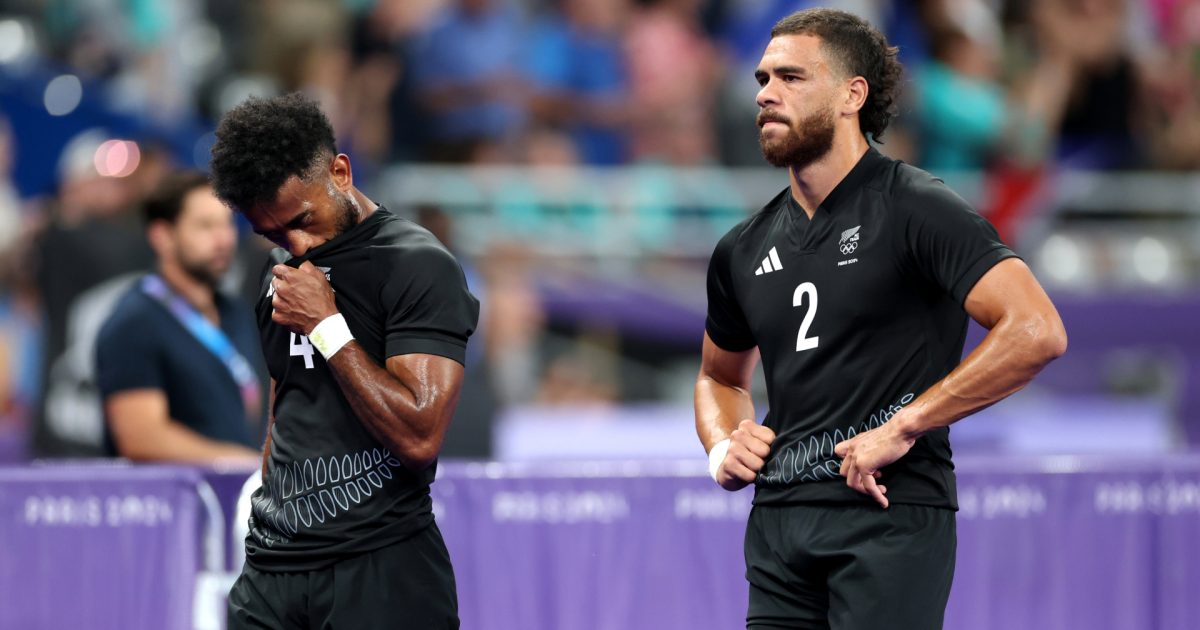New Zealand’s loss in Olympic quarters shows rugby sevens’ ‘brutal’ nature

Broadcaster Scotty Stevenson has released a meaningful summary of New Zealand’s 14-7 defeat in the men’s rugby sevens quarter-finals at the Olympic Games by highlighting just how “brutal” the sport can be.
On the SVNS Series, the All Blacks Sevens were quite inconsistent for the first half of the season as they were left to scrap it out in the bottom four in both Perth and Los Angeles. But the New Zealanders hit their stride at one of the spiritual homes of the sport.
The All Blacks Sevens beat France in the Hong Kong Sevens Cup Final earlier this year and backed that up with a win in Singapore at the Series’ next leg about one month later. New Zealand also made the semi-finals at the Grand Final event at Civitas Metropolitano.
Former New Zealand men’s sevens captain Karl Te Nana went on SENZ earlier this week and spoke about how that run to glory in Hong Kong China was the “launching point” for the team. Te Nana even explained how the Kiwis might “peak” at the Olympic Games in Paris.
But they’ve fallen well short of Olympic gold.
They may have taken out the overall Series title in 2022/23, and then won three Cup Final this season, but the Kiwis will not stand on top of the podium at the Olympics after losing to arch-rivals South Africa 14-7 in a thrilling quarter-final.
“It’s over for the All Blacks Sevens team in Paris before the opening ceremony’s even kicked-off and that’s a real disappointment for this team,” Scotty Stevenson said on SENZ Breakfast.
“I’m reminded of the Olympics and the profile it brings to certain sports in this country and the expectation that comes with that… Scott Curry has been a leader in this team for probably a decade or more and I can’t imagine how disappointed he is right now.
“Dylan Collier in the same category as Scott Curry. Joe Webber in the same category as both the aforementioned, and other such as Tone Ng Shiu and Andrew Knewstubb, who ply their trade on the World Series of sevens.
“Sevens can be quite niche. But, obviously, the Olympics is a pinnacle event and that draws more eyeballs… sevens is probably one of the most brutal sports in the world. What it demands of you physically, what it demands of you mentally, what it demands of a team and the cohesion needed to win these games.
“Today, they weren’t great… in a sport or version of rugby that is getting more competitive across the board… South Africa have been a great opponent in sevens rugby for the All Blacks over many, many years, and today they were just defensively too good.”
The New Zealand players will be supremely disappointed with how this tournament at the Saint-Denis venue went. They had genuine ambitions of taking out a medal and their recent form on the SVNS Series suggested they’d be in with a fighting chance.
After going through pool play with an unbeaten run of three wins from as many starts, which included triumphs over South Africa and Ireland, the Kiwis prepared for another clash with their old foe in the knockout rounds.
But Selvyn Davids swung momentum in South Africa’s favour with a try a few minutes into the contest, and the captain backed that up with more individual brilliance to set up another score which saw the ‘underdogs’ lead 14-nil.
Team New Zealand struck back with a try on the stroke of half-time to Moses Leo, who ran down the left edge to score the crucial try. They were always in with a chance but South Africa stood tall on defence which was the difference.
No points were scored in a thrilling second half.
Sevens is a brutal game.
“New Zealand didn’t bring their A-game when they really needed to and in front of a massive crowd at Stade de France, it just wasn’t to be,” Stevenson continued.
“I can’t imagine how devastating that is… but take nothing away from those athletes and what is required to represent New Zealand or any team for that matter, in sevens rugby. It is tough, it is uncompromising.
“Today is evidence, yet again, that even though we have huge expectations of our teams at an Olympic Games, maybe… we have to accept the fact that at pinnacle events such as this, the pressure is so great that sometimes… one game, you might not bring is what is required.
“That is the finest of margins and that is the Olympic Games.”
South Africa will take on tournament hosts France in one semi-final, while two-time defending Olympic gold medallists Fiji will come up against a dangerous Australian side.































